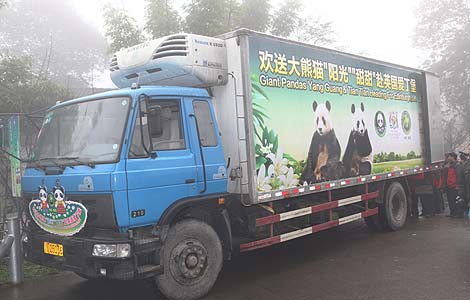10 years on, challenges remain for China
Updated: 2011-12-12 06:45
(Xinhua)
|
|||||||||
BEIJING - For China, the past decade is a period of historical changes.
Ten years ago this Sunday, China joined the World Trade Organization (WTO). The WTO membership heralded unprecedented economic growth for China, helping it grow into the world's second largest economy and largest commodity exporter.
The export-oriented economy pattern gifted China with the world's largest stockpile of foreign exchange reserves, which ballooned to $2.85 trillion by the end of 2010 from only &212.2 billion in 2001.
Changes for the Chinese people also include buying cheaper cars, enjoying more products of international brands, traveling to more countries and seeing "Made in China" flourish elsewhere in the world.
Although China's economic miracle does not start from December 2001, the WTO membership does help stabilize and accelerate the country's fast expansion, said WTO Director-General Pascal Lamy.
The past decade proves China's WTO entry has brought benefits for both Chinese and the rest of the world, President Hu Jintao said in a keynote speech at a forum to commemorate the 10th anniversary of China's WTO entry.
Besides direct and indirect aids to some least developing nations, China's imports, averaging $750 billion each year in 2001-2010, helped create employment and investment opportunities for its trading partners.
Ten years of adapting
The past decade has witnessed China's efforts in adapting to the WTO rules and integrating with the world.
Over the past decade, China abolished, revised and adopted over 3,000 laws, regulations and department rules, fulfilled its commitments to the WTO in tariff and non-tariff areas, and further opened its service markets to the outside world.
The past ten years did not only witness China's efforts to embrace international rules and norms, but also its growing experience to defend its own rights and interests using these rules.
This transformation that brought in foreign investment and promoted market economy was then viewed as "wolf at the door" - with tariffs to be slashed and restrictions on foreign rivals to be eased, a shaky future might loom for some of China's least competitive industries.
However, the industries did not get wiped out but managed to hold up well if not thriving.
"As a matter of fact, ambitious Chinese companies are now more like wolves," said Lu Haiqng, corporate affairs senior vice president of Tesco China. Tapping into the Chinese market in 2004, the UK-based grocery and general merchandising retailer now owns more than 100 outlets in China.
In the retail sector, international competitors, instead of taking over the whole market, sparked the rise of domestic retailers such as Suning and Gome.
"What we see on China's market now is greater competition and consumers gain from the contest," Lu said.
Joining the WTO and the introduction of international rules helped China improve the socialist market economy, which will benefit the country's economic and social development in the coming few decades, said Long Guoqiang, director of the Research Department of Foreign Economic Relations of the Development Research Center of the State Council.
Future challenges
Reform and opening-up, which propelled China's rapid growth over more than three decades, will continue to underpin China's future development, President Hu said.
China will implement a more proactive opening up strategy and open more areas to the world, he said.
The target of the opening up strategy, however, should shift to supporting the transformation of economic development pattern from previous "earning foreign exchange reserve through export expansion," said Long Guoqiang.
China's export-oriented developing pattern, which relies on high inputs, high energy consumption and capital accumulation, resulted in grave negative effects on the sustainability of the economy.
Its expanding foreign exchange reserves and growing trade surplus complicated domestic policy decisions and sparked complaints from its trade partners.
China's over-reliance on exports has made its economy more fragile, especially during a time when downturn hit major developed economies, said Secretary General of the UN Conference on Trade and Development Supachai Panitchpakdi.
China's GDP growth has been slowing this year, to 9.1 percent in the third quarter from 9.5 percent in the second quarter and 9.7 percent in the first quarter.
To steer the national economy through the international financial crisis and its aftermath, China strove to boost domestic consumption after external demand weakened as the eurozone, the country's largest trade partner, continued to wrestle with a deepening debt morass.
The country vows to promote the balanced development of foreign trade and attach importance to both imports and exports, boosting imports while stabilizing exports, said President Hu.











